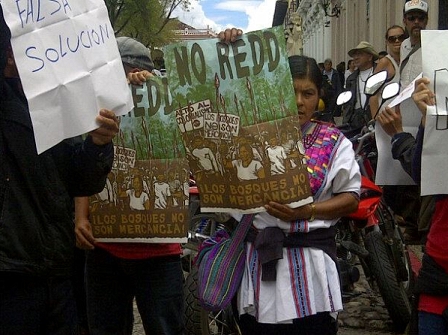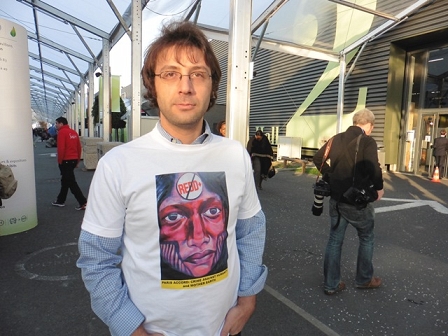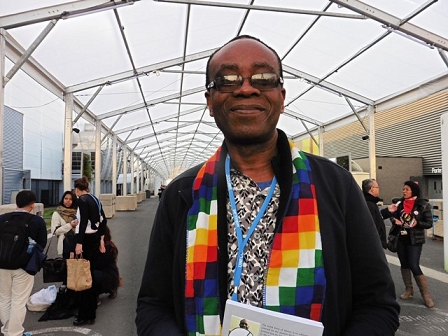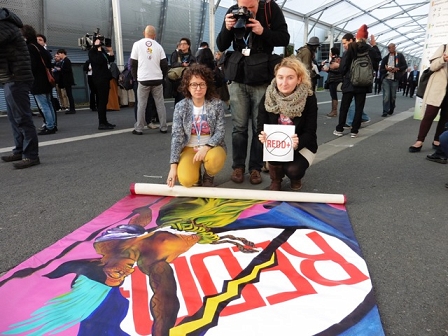Erstellt am: 8. 12. 2015 - 17:03 Uhr
"It's Just An Excuse Not To Cut Emissions"
"No REDD! No REDD! No REDD!"
You have to know your acronyms if you are to understand the COP21 climate summit – this, after all, an event organised by the United Nations – the UN – an organisation that seems to love nothing more than to dream up neatly arranged codes of capital letters.

Friends of the Earth International / Luka Tomac
The men and women chanting at the Le Bourget conference hall were not complaining about the colour scheme of the scarlet mini replica of the Eiffel Tower that has become this COP's signature landmark. They were protesting about the UN's REDD+ plan which stands for Reducing Emissions from Deforestation and Forest Degradation. The plus sign was added later to distance the scheme from early accusations of wastage of funds and inefficiency.
A Simple Idea
The basic idea is deceptively simple – and that is its great allure. Trees store carbon, and they also suck it out of the atmosphere. So if we are to avoid a climate catastrophe we are going to need their help although experts like Tim Flannery suggest we'd have to plant an area the size of Australia to make serious progress on removing the excess carbon already up there.
The Haves and Have Nots
Like so many of the big issues at COP21 this is a story that is rooted in differences between the global north and the global south and is about "climate justice", that magic word President Hollande kept re-iterating at the conference beginning to indicate that the rich countries to understand and appreciate the resentment the developing
world has traditionally felt at these climate summits.
The world needs as many intact forests as possible. The west doesn't have many left, having cleared most of them to make the room for farms and factories that made us rich. The developing world has a plentiful if dwindling supply, but it lacks money. So if we need the developing world, which hosts the most valuable carbon-storing forests, to not follow our "dirty example" and keep their forests intact we are going to have to pay for it. That's the logic of REDD.
No Climate Solution Without a Stop to Deforestation
And we have to do it quickly. Deforestation, which often involves burning the forests, accounts for about 20% of global emissions of carbon dioxide – that is more than the entire global transportation emissions. This clearly has to stop. We need the forests as a carbon sink. Over several years the REDD scheme has helped calculate the value of a hectare of living forest so it is worth more than a hectare of valuable forest felled for timber or cleared for agriculture.
The money comes from the rich world which, according to the draft text, will have to stump up between $20-$35bn every year to funnel to money to where it is needed. Surely that's a win-win solution? We keep getting air to breathe and the owners of the forests get the money.

redd-monitor.org
But that is precisely the issue says Ben Schreiber, director of the climate and energy sector at Friends of the Earth, USA: "We're opposed to REDD not because we don't want to protect forests but because we think that this market mechanism is a flawed way of doing so."
Who's Forest Is It Anyway?
As soon as billions of dollars are on offer, simple solutions become less simple. The forests are often home to tribal people, who despite sometimes engaging in small scale slash and burn agriculture, have in fact some of the smallest carbon footprints in the world. And yet, says Schneider, partly due to an absence of land-rights they find themselves either kicked off their land and/or banned from living their traditional ways of life.

Chris Cummins
"They are basically people who are not responsible for the climate problems and yet they are being told that their lifestyles are unacceptable in this new carbon-constrained era. It's simply not fair," he says.
Controversially, the money has come from corporate sponsors including the oil giant BP and America's largest coal burner, American Electric Power. Activists have deduced from this that rich countries annd companies are using the mechanism as an excuse not to reform their energy production.
A bit like a Mafioso absolving himself at confession, rich countries can continue to pollute with fossil fuel emissions because they are paying for some trees to remain standing. Schreiber says they have kept on polluting while effectively sponsoring the curtailment of the freedoms of traditional forest-dwellers.
Candy Marza from the group Indigenous Environmental Network is frankly disgusted that REDD is what is being offered as a solution to the climate crisis. She says corporations in the developing world use the mechanism to make money while doing little to combat carbon emissions: "They say that they're saving forests. A lot of times though they even cut down a whole old-growth-forest and they'll plant a mono-crop plantation like palm oil."

chris cummins
Nnimmo Bassey, director of the Nigerian based HOMEF group says that "the world needs to protect its forests but REDD does not protect the forests, REDD is simply a process that says trees are not trees but a carbon store." Bassey described as "fiction" the belief that their excesses are wiped clean by the amount of carbon stored in the trees. One of the models for REDD was the Noel Kempff Climate Action Project in Bolivia, but in the first years the scheme was introduced to Bolivia, from 2000 to 2005 overall deforestation in the country actually went up by 4.4%.
A False Solution?
Could that happen with REDD? To get access to the funds, poor countries are supposed to prove that the trees protected for REDD had actually been earmarked for destruction. But this is clearly hard to monitor, particularly as many of the world's forests are found in countries such as DR Congo that are hardly famous for transparent governance.
"They say the trees are being protected in the REDD reservation while cutting and burning the forests elsewhere," says Bassey, who is also co-director of the No REDD in Africa Network and recent winner of the Right Livelihood Award. "It is like someone putting their feet in the fridge and head in the sun and believing their whole body will be cooled down."
The UN admits that the mechanism has undergone teething problems since its conception in 2005 but insists though trial, error and years of international negotiation they have designed tougher safeguards and transparency that should be able to restore global faith in the program. Demands for tougher measures to ensure environmental and human rights "safeguards" stemming from Norway, the EU and Switzerland are among the reasons the negotiators are expected to working hard on the text until the last moments of the Paris conference.
Today in Paris UN officials called the monitoring system "robust" saying many countries were now able to base their policies on the concept of stopping deforestation and strengthening law enforcement and forest governance in the countries where REDD+ projects are underway.

chris cummins
But it seems none of this is likely to placate Candy Marza: "They talk about planting a tree but they don't talk about how they already destroyed the forest that was there before in order to do that. They don't talk about how indigenous peoples can no longer manage their own forests. They don't talk about how they pay people off to make these carbon-market-mechanisms work. It really is a commodification of the sacred which is the air we breathe."
Is Flawed Better Than Nothing
Everyone agrees that forests have to be protected. And everybody agrees to expect poor countries to simply forgo the sort of industrial development that made the West rich without expecting some sort of compensation. It is easy to say no: so what is the solution? And is a flawed solution better than doing nothing at all?
"What we want is for fossil fuels to stay in the ground," says Friend of the Earth's Ben Schreiber. "We want to stop talking about false solutions. We want to talk about a transition to a 100% renewable future. We don't want to hear about any more excuses that allow rich countries to keep polluting."



